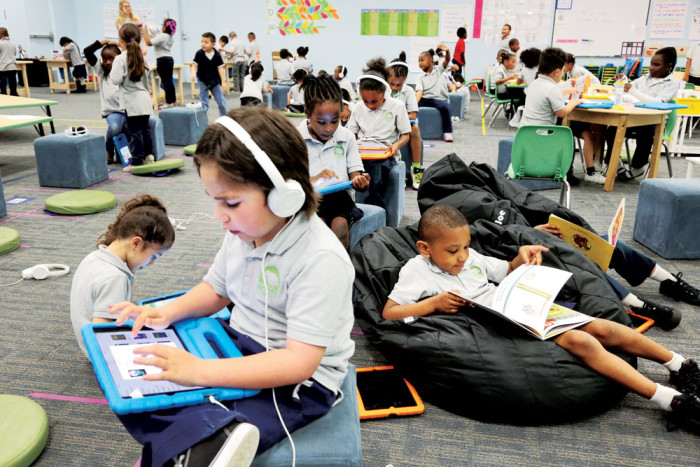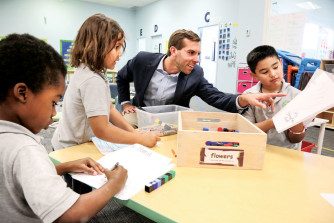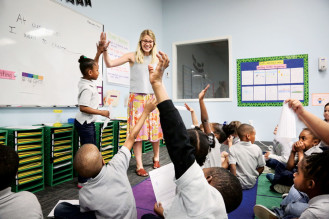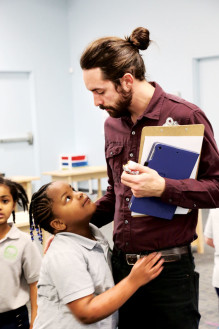
The Grove is a large, open learning environment that allows every Roots scholar to have a personalized schedule. In this picture, Roots scholars learn in the iPad and Library centers (two of The Grove’s five centers).
As adults, we like to say “age doesn’t matter” to avoid being stereotyped. To the people behind Roots Elementary School in northeast Park Hill, the same can be said for children. The charter school, which opened last fall with kindergarten and first grades, takes the unique approach that a student’s age isn’t the most important thing about them instructionally. “The way most schools are structured is to group kids by age, which determines their grade levels, bundles them in random groups and puts them in a classroom,” says Roots Elementary Principal and Founder Jonathan Hanover. The students, or “scholars” as they are referred to at Roots, may all be 5-years-old, for example, but, he says, that’s where the commonalities end.
“The way the traditional system is structured is a teacher is told to teach a certain objective to 30 kids on October 23 because that’s what 5-year-olds are supposed to learn on October 23,” says Hanover as an example. “But in reality that might be the right objective for only four or five of those kids but others need different objectives.” In response, Roots reimagines how a school could be structured.

Principal Jon Hanover engages with scholars working on an advanced math activity.
Customized learning plans are created for each child to provide extra support in a subject they are struggling in or more challenging work where they are at a more advanced level, using curricula from different grade levels depending on what they need. A unique staffing model and iPads for all supports that individualized format. Grade level doesn’t determine much about a scholar’s day since instruction is based on individual needs. During a day, scholars are likely to interact with peers at their grade level as well as with those of different ages who are working at a similar instructional level. If a student needs to be retained, this approach creates a less visible separation from peers, thus mitigating some of the emotional impact of being retained.
“Habits of Success Teachers,” aka “Coaches,” help students with executive functioning skills including time management and goal-setting as well as social and emotional growth, the kind of skills Hanover says get lost in traditional schools but that help predict success in college and career.

Scholars share and celebrate each other’s hard work. Writing teacher Ms. Wagner gives a scholar a high-five after sharing her personal narrative with the class.
The Coaches are the kids’ anchor at school, building relationships with the children and their families, helping them through their personal learning plans. “Academic Content Teachers” each specialize in a certain subject such as math or English, enabling them to more deeply understand the subject for their range of learners.

Mr. Rondeau talks 1-on-1 with a scholar about her goals for writing class.
The school’s philosophy comes from researching what other
high-performing schools are doing and adapting elements the school felt would work best without necessarily reinventing the wheel. “If we were just trying to do everything different, there’s no way we’d be able to do it,” says Hanover. “It’s having a strong foundation of established best practices that we’ve researched from around the country and then standing on the shoulders of giants in innovating around specific problems that even the best of the best still struggle with.”
This summer, the school will move into its permanent building at 3475 Holly St., currently under construction, where it will grow by one grade level per year through fifth grade. The school is currently enrolling for next year and plans to offer bus stops at Ashley Elementary (Stapleton), Hallet Fundamental Academy (Park Hill), and MLK Early College (Green Valley Ranch).

Denver Mayor Michael B. Hancock spoke at the groundbreaking ceremony for Roots Elementary’s brand-new facility that will open in Northeast Park Hill in fall 2016.
The Roots program includes free, full-day kindergarten, which Hanover and the board, a diverse group of business and civic leaders, consider essential. “We’ve been fortunate to have them [our board] and to engage a lot of community organizations that see our model, and the way we are approaching the school, as the wave of the future,” says Hanover. “They want to support us as a demonstration case to the rest of the city and the country for what school can be for little ones.”



0 Comments